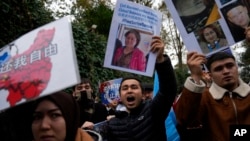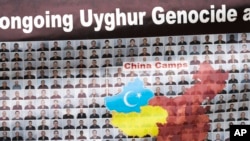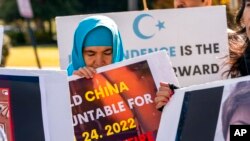Beijing on Friday accused U.S. Secretary of State Antony Blinken of propagating an “egregious lie” about Xinjiang in his remarks to the International Religious Freedom Summit.
“This past November, I named a dozen nations as ‘Countries of Particular Concern’ because of their egregious violations of religious freedom, from Russian authorities … to the People’s Republic of China perpetrating an ongoing genocide against predominantly Muslim Uyghurs,” Blinken said Tuesday.
Chinese Foreign Ministry spokesperson Mao Ning said Blinken’s “remarks are contrary to the basic facts and deeply rooted” in ideological bias.
“The accusation that China has been ‘perpetrating genocide’ is nothing but an egregious lie propagated by the U.S. side,” Mao said Friday at a news conference in Beijing. “Xinjiang enjoys social stability, economic development, ethnic solidarity, religious harmony and rising living standards.”
Contrary to Beijing’s claims of “harmony” in Xinjiang, some Uyghurs living abroad, who have been unable to freely contact their family members in Xinjiang for years, say that Chinese authorities have recently detained their loved ones.
Kewser Wayit, a 26-year-old Uyghur mechanical engineer, has lived in the United States since 2013. In 2019, he posted a video on YouTube asking the Chinese government to allow him to communicate with his family.
“Last year, a person added me on WeChat and introduced himself as the Chinese security official and let me talk to my parents for a few times through his WeChat,” Wayit told VOA. “However, my communication with my family was not a free one.”
In recent years, some countries, including the United States, have accused China of committing genocide: arbitrarily detaining more than 1 million Uyghurs and other Turkic Muslim groups in internment camps, where forced labor, forced sterilization of women, and forced marriage of Uyghur women to Chinese men is common.
China denies the accusations, saying that Xinjiang is safe and stable with good momentum of development.
“People there live a peaceful and happy life and their human rights, regardless of their ethnic background, have received better protection,” Mao told reporters in Beijing during a news conference this week.
According to Wayit, even though he couldn’t freely call his family members in China, he could know of their safety through WeChat posts from his 19-year-old sister, Kamile Wayit, who attends university in Henan province in Central China.
“My sister deleted me from her WeChat contact list,” for her safety Wayit said. “Though I couldn’t communicate directly with her on WeChat, I was still able to see her latest 10 posts.”
But since Dec. 12, Wayit’s sister has stopped posting on WeChat, he said. He has contacted friends and even called the police station where his family lived in Xinjiang and confirmed that his sister was arrested that day by the Chinese police for allegedly sharing a video about a protest in China on her WeChat account.
In late November, protests erupted in China against its “zero-COVID” policies after a fatal apartment building fire in Urumqi, the capital of Xinjiang.
“I’m devastated to learn that my 19-year-old sister, Kamile Wayit, has been detained recently by the Chinese authorities when she returned home for winter break,” Wayit told VOA in a video interview. “I demand Chinese authorities release her immediately and let her speak to me.”
According to Wayit, his cousin, a 23-year-old university student from Jiaotong University, was also arrested last summer when he returned to Urumqi from Shanghai.
He heard that his cousin, Zulpikar Kudret, “might have been sentenced to five or seven years in prison for allegedly using Western social media apps on his phone when he was a high school student,” Wayit told VOA.
Wayit is not the only Uyghur exile whose family members have been detained recently by the Chinese authorities in Xinjiang.
Two siblings who live in Sweden, Munawar Sadir, a 49-year-old bus driver, and Saidin Sadir, a 40-year-old assistant nurse, told VOA their brother, Behtiyar Sadir, was detained by the Chinese police in Urumqi last October.
According to Saidin Sadir, his older brother, Behtiyar, a 47-year-old businessman and a nutritionist living in Urumqi, had severed all ties with his brothers and sister in Sweden in 2017 when China began, in the name of cracking down on terrorism in Xinjiang, arbitrarily detaining Uyghurs and members of other majority Muslim ethnic groups.
“I was only able to learn about his existence through the latest 10 posts on his WeChat account even though he deleted me from his contact list,” Saidin Sadir told VOA. “My brother stopped posting on his social media on October 13, 2022.”
After a few weeks, Saidin Sadir said, he contacted his friends in Urumqi and learned that his brother was arrested by Chinese police at his home in Urumqi in October.
“I called the police officer who was in charge of my brother’s residential community,” Saidin Sadir told VOA. “The Chinese police officer whom I called didn’t deny my brother’s arrest and when I asked whereabouts of my brother and why he was under arrest, he demanded I come to his police station and learn the details and hung up the phone.”
Munawar Sadir said that when their father died in 2021 in Urumqi, she and Saidin were not even able to talk on the phone with their brother Behtiyar.
“When my dad passed away in November 2021, I was crying here and I called my younger brother in China, and he immediately hung up the phone,” Munawar told VOA. “He didn't dare to answer my phone call.”
Munawar Sadir said she and Saidin want the Chinese Communist Party to immediately release their brother from arbitrary detention.
“My brother and I can't accept this kind of slander for no reason, so I ask that the Chinese Communist Party should not go too far, and should not be too bullying,” Munawar told VOA. “We now ask you to let him come out quickly and healthy, live his life, and we will live ours. As he is also a citizen of China, you should treat him fairly.”






